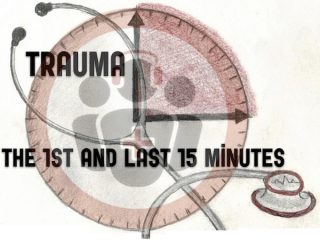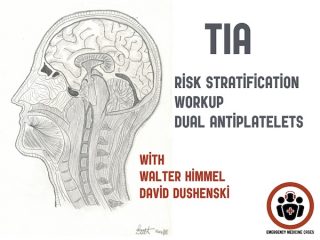Most Recent
Ep 118 Trauma – The First and Last 15 Minutes Part 1
In this part 1 of Trauma - The First and Last 15 Minutes, we answer questions such as: how should we best prepare our team, our gear and ourselves for the trauma patient? How does resequencing the initial trauma resuscitation save lives? How can we most readily identify occult shock, the silent killer in trauma? What are 7 actions to consider in the first 15 minutes of resuscitation? How can the concepts of "controlled resuscitation" and "resuscitation intensity" help us decide resuscitation targets and when to activate a massive transfusion protocol? and many more...
POCUS Cases 7 IVC Assessment of Volume Status
Dr. Simard explains how to incorporate IVC POCUS into your assessment of volume status, he reviews the literature on accuracy of POCUS for assessment of volume status, reviews the key POCUS steps and cautions us about interpretation of your findings in intubated and deep breathing patients...
EMU 365 Upper GI Bleed with Walter Himmel
Walter Himmel takes us through the resuscitation of a sick patient with an UGIB and the management priorities including blood products, antibiotics, TXA, octreotide, pantoprazole and endoscopy in this EMU 365 video...
BCE 78 Traumatic Cardiac Arrest
In anticipation of EM Cases Episode 118 Trauma: The First and Last 15 minutes with Andrew Petrosoniak, Kylie Bosman and Chris Hicks we have Joe Nemeth, Trauma Fellowship Director at Montreal General and Associate Professor at both McGill University and University of Toronto discussing his Best Case Ever of a teenager who was "stabbed in the box". Rajiv and Joe discuss preparation for trauma, the role of POCUS in predicting survival in traumatic cardiac arrest, the HOTT mnemonic for reversible causes of trauma arrest and more...
Ep 117 TIA Update – Risk Stratification, Workup and Dual Antiplatelet Therapy
Much has changed in recent years when it comes to TIA risk stratification, workup and antiplatelet therapy. In this podcast we use the overarching theme of timing to elucidate how to distinguish true TIA from the common TIA mimics, the importance of timing in the workup of TIA, why the duration of therapy with dual antiplatelet therapy and timing of starting anticoagulation in patient with atrial fibrillation, contributes to the difference between preventing catastrophic strokes and causing intracranial hemorrhage...
JJ 14 Epinephrine in Cardiac Arrest
Does epinephrine improve the chances of return of spontaneous circulation at the expense of the brain? In other words, while we know that epinephrine doubles rates of ROSC in all comers in cardiac arrest, there’s never been robust evidence for long term improvements in neurologic functional outcomes. So, are we saving lives, or are we prolonging death? Find out the answer in this Journal Jam podcast with Justin Morgenstern and Rory Spiegel...







